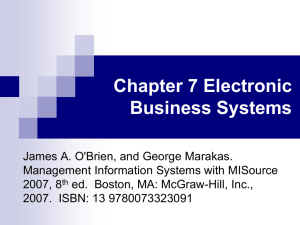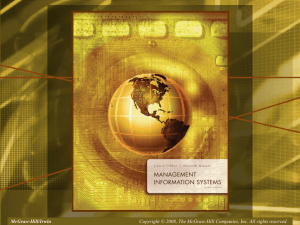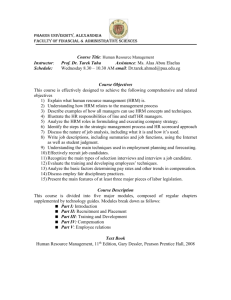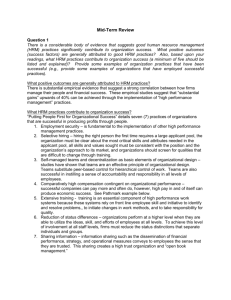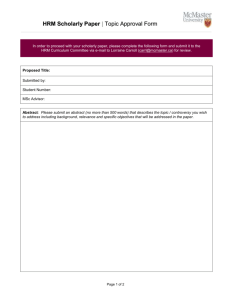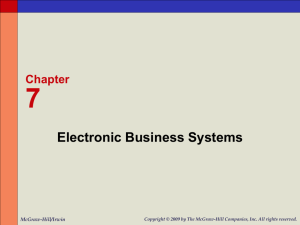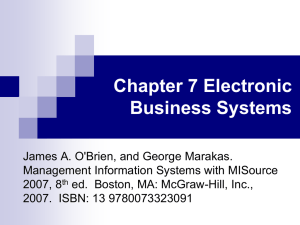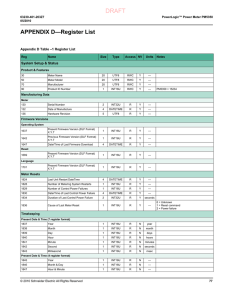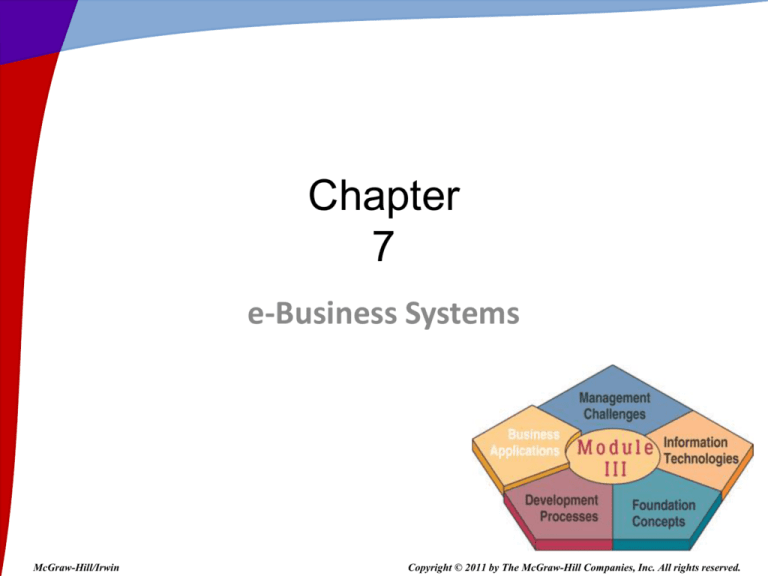
Chapter
7
e-Business Systems
McGraw-Hill/Irwin
Copyright © 2011 by The McGraw-Hill Companies, Inc. All rights reserved.
Learning Objectives
• Identify the following cross-functional
enterprise systems, and give examples of
how they can provide significant business
value to a company
– Enterprise application integration
– Transaction processing systems
– Enterprise collaboration systems
7-2
Learning Objectives
• Give examples of how Internet and other
information technologies support business
processes within the business functions of:
– Accounting
– Finance
– Human resource management
– Marketing
– Production
– Operations management
7-3
Enterprise Business Systems
• Use Internet, networks, and IT to support
– Electronic commerce
– Enterprise communications and collaboration
– Web-enabled business processes
• E-commerce is the buying, selling, and
marketing of products, services, and
information over the Internet and other
networks
7-4
RWC 1: Enterprise Architects
• 4 crucial Cs
– Connection
– Collaboration
– Communication
– Customers
• All projects fit in the overall strategy
– Best for company, not individual departments
7-5
Cross-Functional Systems
• Cross the boundaries of traditional business
functions
– Reengineer and improve vital business processes
– R&D overlaps Marketing and Manufacturing
7-6
Enterprise Application Architecture
7-7
Implementing Global Applications
• Globalization vs true-blue American formula
– What is Globalization?
– What is the true-blue American business formula?
• Working virtually is critical
– Why?
• What is the difference between decision
making approach in UK and US?
7-8
Enterprise Application Integration
• EAI connects cross-functional systems
• Serves as middleware to provide
– Data conversion
– Communication between systems
– Access to system interfaces
7-9
How EAI Works
7-10
Transaction Processing Systems
7-11
The Transaction Processing Cycle
7-12
ECS Tools
7-13
Exploring Virtual Worlds
• Virtual world - training
– Rollovers
– Multicar pileups
– Life threatening injuries
– Police training
– Military use
7-14
Functional Business Systems
• Information systems that support
– Accounting
– Finance
– Marketing
– Operations management
– Human resource management
7-15
Marketing Systems
• Marketing systems are concerned with
– Existing products in existing markets
– New products and new markets
– Serving present and potential customers
7-16
RWC 2: Unified Financial Reporting
• Originally non-uniform reporting
– 14 general ledgers
– 12 reporting tools
– 17 financial data repositories
– 300,000 spreadsheets
• Finance Tranformation Program - Focus
–
–
–
–
Common definitions, rules and procedures
Trade-offs to target core functionalities
All subscribe to central book of record
Unify all financial people
7-17
IT in Business
7-18
Marketing Information Systems
7-19
Targeted Marketing
• Advertising and promotion management concept
– Five targeting components
7-20
Sales Force Automation
• Outfit sales force
– Notebook computers,
– Web browsers
– Sales contact software
– Marketing websites
– Company intranet
• Goals
– Increase personal productivity
– Speed up capture and analysis of sales data
– Gain strategic advantage
7-21
Computer-Integrated Manufacturing
7-22
HRM Systems
7-23
HRM and the Internet
• Recruiting employees
– Corporate website
– Commercial recruiting services
• Posting in Internet newsgroups
• Communicating with job applicants via
–
–
–
–
e-mail
Monster.com
HotJobs.com
CareerBuilder.com
7-24
HRM and Corporate Intranets
• Corporate intranet uses
– Process common HRM transactions
– Allow around-the-clock HRM services
– Disseminate information faster than previous
company channels
– Collect information from employees online
– Allow HRM tasks to be performed with little HRM
department intervention
– Provide training
7-25
Employee Self-Service (ESS)
• Intranet applications allow employees to
– View benefits
– Enter travel and expense reports
– Verify employment and salary information
– Access and update personal information
– Enter time-sensitive data
• Provide hiring systems
7-26
Accounting Information Systems
7-27
Business Accounting Systems
7-28
Financial Management System
7-29
RWC 3: Cisco Systems
• TelePresence
– Life-like, in-person experiences
– Promises to revolutionize collaboration
• Strong competition
– HP - Halo telepresence system
– Polycom - high-end telepresence system
• Biggest challenge
– Innovation and growth
7-30
RWC 4: Strategic Information Systems
• Electronic hiring system
• Significant payoff is significant
– Filling job openings two weeks faster
– Saving at least $1,500 per job.
• HR called to be a strategic business partner,
• IT provides innovative solutions.
7-31

